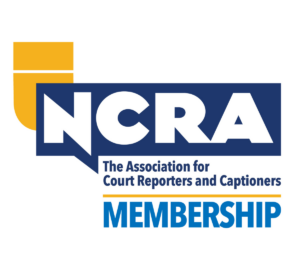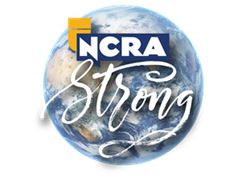 By Cassandra Caldarella
By Cassandra Caldarella
The intention of this article is not to convince you to become a court reporter or that court reporting is a great career. My intention is just to share with you some points about what has made court reporting a great profession for me. Here are the top 10 things I love about being a court reporter:
1. Recession-proof, high-demand career
From the moment I graduated from court reporting school and was licensed as a certified shorthand reporter, I have never experienced a day without working that I didn’t want to work. In these tough economic times, it’s easy to see why I’ve listed this one first. The best recession-proof jobs are those that are least sensitive to economic downturn and have the highest combined scores for pay, projected workforce growth, and number of openings. In my experience, a recession-proof job is one that remains in high demand even through a bad economy. Though no career is entirely recession-proof, court reporting is more constant than most others when times are hard.
Several elements create the high demand for court reporters. First, there is an increased demand in the legal field. Crime tends to rise dramatically when people feel desperate and experience serious financial problems, so the number of court cases increase. Civil disputes also reach a boiling point, resulting in more civil litigation when times are tough.
Despite the state budget cuts that resulted in the layoff of hundreds of court reporters in California in the last several years, some counties decided to privatize the court reporting duties in civil courtrooms, meaning that court reporters still ended up going to work in civil courtrooms, but they get paid directly from attorneys or agencies instead of from the county. As a result, there was no loss in court reporting jobs; it actually created new job opportunities for freelancers who never worked in court before. It’s anticipated that more and more counties will follow this lead and begin to privatize the reporters in civil courtrooms throughout California and the rest of the country, which will lead to a significant projected workforce growth.
Second, there is an increase in demand in other industries that require realtime court reporters to provide transcriptions or captioning of conferences, seminars, video, and television. The growing number of fields that require stenographers includes television, sports, politics, business, medicine, and many more. According to research conducted by Ducker Worldwide in 2013, which was commissioned by NCRA, more than 5,500 new court reporting jobs are anticipated across the U.S. by 2018 due to significant retirement rates. The median age of working court reporters is 51 years old and more than 70 percent of the court reporting population is over 46 years old.
2. High income potential
The salary of a court reporter is heavily dependent on geography. A court reporter’s income can also depend upon their certifications and services provided. A reporter who provides realtime translation services can make more than one who doesn’t. Los Angeles and New York freelance court reporters can average about $100,000 a year, while the national average is around $46,000 a year. Keep in mind that many reporters prefer to work part-time, so that drives the national average income down. I know several reporters who make $225k to $300k per year consistently. I also know of one who makes close to $600k per year consistently. The sky is the limit if you’re willing to work hard and be a top-notch reporter.
Salaries of official court reporters are public information and can be easily found online, although transcript information is not public information. Many busy official reporters will tell you that their transcript incomes can be just as much as or double their annual salary. An official court reporter position in Riverside County Superior Court in California pays $108k per year, or $52/hour. An annual salary for an official court reporter in Cobb County, Ga., is $41,614.02 to $66,583.24, or $32.01/hour, plus transcript fees. There are also official court reporter positions in federal court. The salary for an official court reporter in the United States District Court, Eastern District of New York, is $87,770 to $100,936 plus transcript fees. Those are examples of just a few of the recently advertised official positions.
According to the U.S. Bureau of Labor Statistics, the growth rate for court reporting salaries is expected to increase by 14 percent through the year 2020. This is one profession where talk is translating to tangible long-term loot.
3. Variety of settings
Interesting job content is one of the top ten factors for employee happiness on the job according to a recent study from Boston Consulting Group, which surveyed more than 200,000 people around the world. Court reporting offers such a huge variety of subject matter that it makes it one of the most interesting professions. Court reporters travel from job to job or courtroom to courtroom and go from case to case. Every case is different, and we’re usually learning so much from highly educated people who look at us with wonder and amazement at what we do. We can go from a transvaginal mesh class action case yesterday to a human trafficking case today to a mesothelioma asbestos case tomorrow. Reporters who have three and four decades of experience frequently comment on how even they learn something new every day. The amount of learning of new subject matters is endless.
The variety of job settings in court reporting is staggering.
Our views usually change with each job, and so do the attorneys we’re working with. We can be on the 43rd floor of a high-rise in downtown or a wealthy law firm with a view of the ocean in Newport Beach or Santa Monica or in a courtroom in any number of locations or outdoors on a mountaintop in the Hollywood Hills. Sometimes we’re surprised to be sitting in the same room with a celebrity. I’ve had many celebrities in my courtroom as parties and as jurors, who shall remain nameless.
The best part is that we can edit our jobs from anywhere in the world. We can work on our laptops on a beach in Hawaii with our toes in the sand and an ocean view of the Pacific Ocean. If you want to pack up and leave your hometown, it’s extremely easy to find a job across the United States. If you want to stay local, that’s easy, too. Also, we can take jobs anywhere in the world. There are so many international travel opportunities in this profession if you’ve got your passport and a desire to see the world. Whether you are looking for jobs close to home, to move across the country, or for opportunities to travel, the possibilities are endless!
There is also a lot of opportunity for CART and captioning work. CART stands for Communication Access Realtime Translation. It is verbatim text of spoken presentations provided for live events. Only the text is provided on a computer screen or projected for display on a larger screen. CART may be provided in the classroom, at meetings, workshops, and other presentations, including live theater – anywhere that someone with a hearing loss needs to hear in a group setting. Early in my my career, I took on a couple of CART assignments where I was assisting a person who was hard of hearing on a college campus. I would attend his classes with him and provide him a screen of my realtime so he could read along. Reporters can also choose to do captioning from their own home offices.
Captioning is the text of the audio portion of a video or film displayed directly on the video or film, often on the bottom of the screen. This may include not only the words, but the sounds that are important to understand and the source of the sound. Reporters can caption the news from their home office or they can report live from the sporting event, corporate meeting, or other presentation.
The greatest thing about the variety of settings is that you will never get completely burned out with your career. You may get burned out with your current job, but there are so many different types of settings to work in that you can switch gears to keep it interesting. Burned out in court? Switch to captioning the TV news from home. Those couldn’t be more different. There are lots of possibilities!
4. Longevity
The profession of stenography stems from man’s desire and his necessity to preserve the happenings of yesterday and today for tomorrow. It was born with the rise of civilization in ancient Greece. Ancient scribes once used shorthand to record speeches of politicians, philosophers, and other public speakers in Judea, Persia, and the Roman Empire. Abraham Lincoln entrusted a stenographer to record the Emancipation Proclamation. A stenographer was commissioned to be with Roosevelt at Yalta, Eisenhower on D-Day, and MacArthur at Tokyo. Today, we sit in the White House, the United States Congress, and District and Superior Courts, and we also work in a variety of locations. Stenography is one of the oldest professions and will be around well into the future.
With variety comes a nice long run in a career that offers longevity. One of my dearest court reporting friends has been working as a court reporter since 1970. She’s been an official, a freelance reporter, and an agency owner. After 47 years, she’s still working full time and has plans to never, ever retire. She will just keep reporting until she can’t. Many court reporters have enjoyed several decades-long careers in this profession and plan to work well into their retirements. Most people face the challenge of transitioning to new careers at least two to three times in their lifetime. Longevity in court reporting is possible because of the variety of jobs where there is ample opportunity to remake your career without having to start from scratch.
Technology has come a long way in the last 20 years, but it still has a long way to go before it will be a threat to the profession of court reporting. The experimentation with replacing human court reporters with audio recording has failed time and again. It’s analogous to replacing all language interpreters with translation software. It seems ridiculous because everyone knows the complexities of their jobs. However, court reporting is largely a mystery to the attorneys and judges that work with them and even more of a mystery to a financial analyst who is facing budget restraints. The truth is, court reporters are tasked with the protection of the record. Court reporters use extremely sophisticated technology to create a record using machine shorthand, and it is a process that takes an average of three years to master.
A few of the things a human court reporter can do that digital recording can’t are: capture testimony at 99 percent or greater accuracy, handle multiple speakers at the same time, identify speakers, understand different accents and dialects, create an immediate draft transcript, create a same-day or next-day final transcript, mark exhibits, swear witnesses, and stop a proceeding for clarification due to an accent or soft-spoken witness, or ask for a repeat because a door slammed or other noise cut out the speaker. Human court reporters are champions, and there is no contest in the creation and preservation of the official record at trial or a deposition.
Even if voice recognition technology evolves to a level of near perfection, it can still never replace the human court reporter because it lacks the ability to control and protect the record and do the human aspects of the job.
5. The people
Humans are social creatures, and Gallup’s research has found that people who have a “best friend” at work are more productive and engaged. My best friend and the matron of honor at my wedding years ago is a court reporter. We met when we both got hired at superior court almost a decade ago. When reporters run into each other out at a job location, there’s an instant connection. Nobody understands us like another reporter. The network of court reporters is perhaps a stronger bond than in any other industry. Nothing illustrates that more than a quick search on Facebook where you’ll see hundreds of groups for court reporters, whether it be Court Reporters Who Love to Cook, Court Reporters and Their Fur Babies, or Why I Love Court Reporting. It is a small world, and every reporter is connected in some way to another reporter or knows about other reporters.
Court reporters are quick to help out a fellow reporter, whether it be mentoring someone, having someone sit out with us to get their apprentice hours, borrowing equipment, or offering tech support. Someone is always there, even at 3:30 a.m., to lend a hand or an ear, at least via social media.
In a study conducted by TINYpulse of more than 40,000 people at 300 companies across the globe, they found that the number one reason cited for loving a job was coworkers, because of the people they work with. I know many, many court reporters who have had their assignment in a courtroom for decades, and their coworkers — which include the judge, the bailiff, and the clerk — are like family to them.
The third group of people that we work with on a daily basis consists of the attorneys and witnesses. I love the fact that almost every day I get to meet and work with some of the best legal minds in the industry and listen to the testimony of experts from a variety of industries who are the best in their field and went to the top schools in the world.
6. Flexible Working Hours
Whether you are a working parent or just want to have a flexible job, court reporting may be the field for you. I know court reporters who work just two or three days a week. Working part-time as a court reporter is common and easily attainable if you are looking for a nice balance between your professional and personal life. Another court reporter can easily pick up where you left off in a trial, arbitration, or multi-day deposition. If you’re in a daily trial, you can easily take a day off to attend your doctor’s appointment or child’s school play, and your coworker can step in and cover for you with no problems. Freelance reporters are able to schedule a short one-hour workers’ comp depo or an all-day video deposition with agencies. If you need to take the day off, then you can simply tell the agency you’re not available for work that day.
I currently work in a courthouse with set hours every day, but I do know of other officials who job share with another reporter. They alternate either the days or the weeks. One reporter works three days one week and two days the next and they alternate, or they alternate entire weeks, so one week on, one week off. They share an office, so combined, they make up one full-time reporter.
7. Mastery
Happy people tend to be successful at work, but surprisingly it’s not your success that causes you to be happy; it’s your being happy that tends to cause your success. Research has identified three factors that make us happy at work: mastery, purpose, and autonomy.
Research finds that people are happiest when engaged in difficult-but-doable activities; that is, activities that involve our being so absorbed in our tasks that time seems to stand still and produce flow. Flow is the state reached when we are so immersed in an activity that we cease to notice the passage of time and have deep, effortless involvement. Time seems to stop. Our happiness is greatest at such times.
When I’m on the job reporting, I’m in “the zone,” like a mystical ecstatic state. It is this full involvement in flow, rather than happiness achieved from sensory pleasures, that makes for excellence in life. It produces deep, long-lasting satisfaction, rather than temporary cheerfulness.
Every day, I am improving as a court reporter. Every day, I’m enjoying what I’m doing, and I don’t want it to finish. Every day involves a challenge where I am stretching my mind and my body. I’m adding words to my dictionary, or I’m writing faster, adding briefs, or I’m exposed to new subject matters. My software has a scorekeeper at the bottom of my laptop screen that tells me in a percentage how well I’m writing. It’s much like playing a video game where I’m constantly trying to improve my score. When things get tough, effort and discipline are required, which helps me to learn to persist. Each challenging job assignment makes me a better reporter, so I thrive on those experiences. My brain is fed with constantly changing positive experiences that prevent the hedonic treadmill from turning.
There are certifications galore. Through the National Court Reporters Association, you can earn your RPR, RMR, RDR, CRR, and CRC certifications and more. The California Deposition Reporters Association has a CCRR certification you can earn as well. The United States Court Reporters Association has an FCRR certification that you can achieve. Then there are speed contests for all three of those organizations that you can enter. There are continuing education opportunities with the superior court and with all of the state and national organizations. There is no limit to what you can achieve in this profession.
8. Purpose
The International Journal of Management, Business, and Administration published a study which discusses how core job characteristics, such as task significance, have important effects on various critical psychological states. It went on to define task significance as the degree to which the job has a substantial impact on the lives of other people. Task significance is one of the five core characteristics of a job that contributes to the experience of meaningfulness at work, which leads to high internal work motivation and high job satisfaction.
Many attorneys and judges have started proceedings by introducing the court reporter as the most important person in the room.
Court reporters have the mission to protect and preserve the record. We preserve the record for appeal, usually the final decision for a case. If there is no court reporter to make a record, attorneys will have to create a stipulated statement of the case to be submitted on appeal.
In Los Angeles County, several of the civil judges required attorneys to prepare a stipulated statement after each day of trial if they chose not to have a reporter. The attorneys usually decided to hire a reporter, rather than burden themselves with extra work during trial. And you can imagine if parties weren’t able to settle their case by the time of trial, getting a stipulation of the attorneys would be an almost impossible task in itself. In felony courtrooms, there is always a reporter to make a record.
I worked on a four-week trial that was overturned on appeal, and I ran into one of the attorneys being interviewed by a major news network outside the courthouse. He caught up to me after the interview and thanked me for my work on his trial preparing daily transcripts and then producing the huge appeal. He said without my transcripts, he wouldn’t have won his case on appeal. The other day, I got a voicemail from an attorney thanking me for a rough draft of his proceedings that he used to prepare his motion. He said he couldn’t have done it without my transcript and thanked me profusely. In another example, in the trial I reported last week, the judge had to refer to my realtime several times in order to make his ruling on objections. And just this morning, a clerk asked me for a judge’s ruling, so I copied and pasted that portion of the transcript to him in an email right away so he could prepare his minute order. We’re constantly reminded of our importance and the role we play in ensuring justice is meted out, and we’re highly valued by attorneys and judges and clerks.
America is a society based on law and justice. I love the fact that I have a role in making this ideal a reality, however small. With two hands, 24 keys, and 225+ words per minute, the impact as a court reporter is limitless.
9. Autonomy
One meta-analysis involving more than 400,000 people in 63 countries found that autonomy and control over one’s life matter more to happiness than money. Autonomy is the degree to which a job provides substantial freedom, independence, and discretion to the individual in scheduling the work and in determining the procedures to be used in doing the work.
Luckily for court reporters, we have a sense of control over our work and over our time too. As a freelancer, I am self-employed and my own boss. I am free to turn down work or take a day off without answering to anyone. I also have control over subcontracting work to proofreaders and scopists. As an official court reporter, even though there are supervisors and managers in my department, I don’t have to answer to a boss. I don’t have annual reviews where someone can critique my work. I have the freedom to do my job without being micromanaged or questioned about decisions I make. My transcripts are handled on an independent contractor status and are not under the purview of the court. I have the ability to control what services I offer and don’t offer to attorneys. And I have the freedom to choose what assignments I get by trying out for courtrooms I want to work in or to float, as I’ve chosen to do. For these reasons, autonomy is on the list of things I love about court reporting.
10. Residual income opportunity
One of the main reasons I chose this profession is for the residual or recurring income opportunity. Who doesn’t love to earn money while not working, right? Once we report a matter, we can continue to get paid for the work for months and years after it’s done. It’s analogous to earning royalties from intellectual property such as books and patents. The record we make is considered our work product. If anyone wants a copy of it, we make money again and again.
Salary jobs are part of linear income. This income is directly related to the number of hours you work. If you work 40 hours, you get paid for 40 hours of work. Official court reporters earn a salary plus transcript income. Some freelance reporters will earn a per diem for the time that they are at a location or just to show up. Our transcript income allows us to continue to make money while doing other things, such as accepting more assignments or taking a day off and going to Disneyland with our family. We can be on the record five days a week and work on transcripts during the evenings and weekends, or we can hire a scopist to help produce the transcripts while we continue to take jobs and keep writing on our machines.
After we produce an original transcript and the copy orders at the time of the job, we can earn money for the transcript again at the time of appeal, which happens in the years following the matter we reported. I have a couple of death penalty cases that I reported that will continue to appeal for the rest of their lives. This is a passive income that I don’t have to personally market or interact with the business in any way. All I have to do is wait for the appeal and deposit the check.
Recently, I was able to take eight months off for maternity leave because I had a steady flow of appeals coming in that I had already produced the transcript at the time of trial and turned them in, then deposited the checks. I made money while staying at home with my newborn baby. This was ideal.
Of course, before the money starts rolling in as a court reporter, you will have to put a lot of time, money, and effort into going to an NCRA-approved court reporting program. You’ll need a lot of patience and determination to see the high income in the future.
Instant gratification is not possible when it comes to being a court reporter, but the rewards are limitless.
Cassandra Caldarella is a freelancer and agency owner based in Santa Ana, Calif. She can be reached at cassarella11@hotmail.com.






















[…] 10 reasons I Love My Career As a Court Reporter, Author, Cassandra Calderella, CSR, Alumna of South … […]